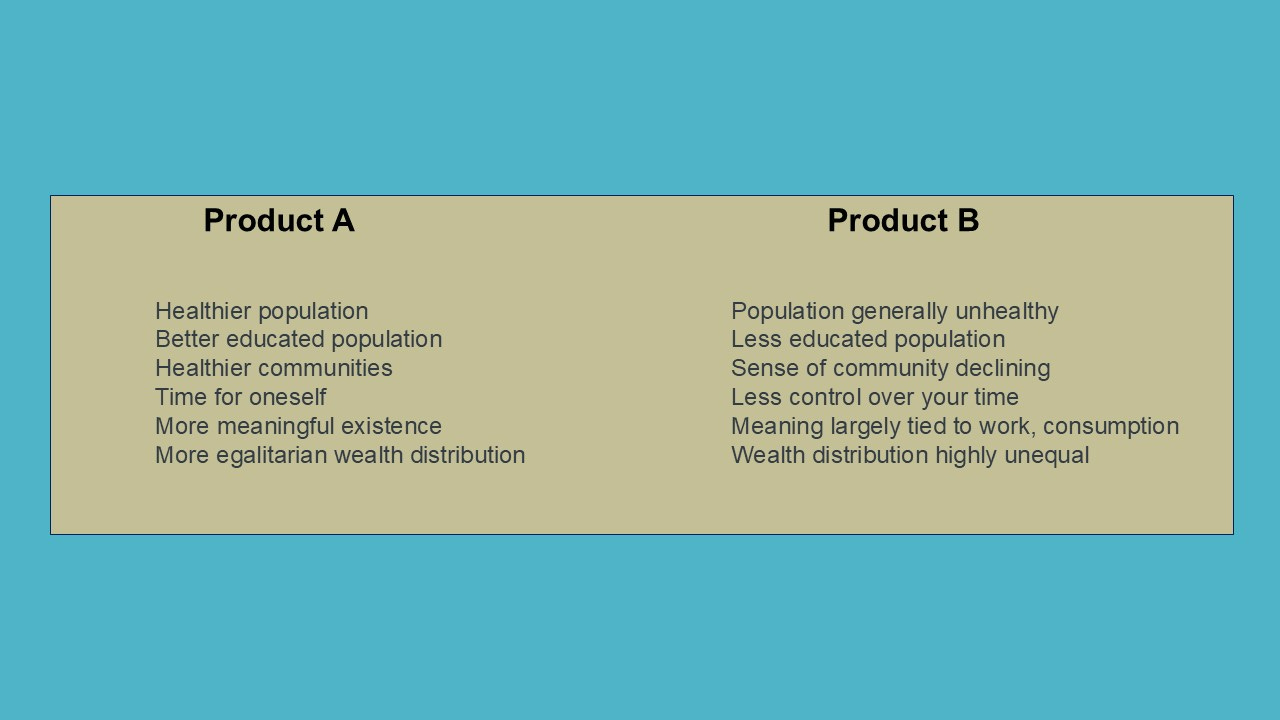Degrowth Won't Make You Poor
It is just the path you take when you value the quality of your life over money.
Photo by William White on Unsplash
One of the main arguments that people trot out against degrowth is that degrowth will make you poor. They understand that degrowth calls for a slowdown and production and consumption, which they use to sow fear about degrowth. They tell people that degrowth means that you will have less material possessions, which means you will be poorer, which means you will be unhappy.
Degrowth isn’t about making people poor. It is about shifting to a society that does not consider material wealth of the wealthy as a useful barometer of a successful society.
We live in a world with unhealthy levels of income inequality. The current levels of income inequality in Western society line up nicely with income inequality before the French Revolution and the Great Depression. Taking a degrowth path would largely dent the wealth of the top 10%, but mostly cut into the wealth of the top 1%. Things wouldn’t change that much for the average person in the lower 90%.
Those advocating for degrowth realize that health, happiness, education, a healthy community, time, meaning in one’s life, and other quality of life factors all get better if we take a degrowth path. Yes, wealth and consumption will be harmed for some - mostly concentrated at the high end of the income ladder. That sounds like a fantastic deal. Let’s take a look at what is being sold to us. Life on a degrowth path (product A) vs. Life on our current path (product B).
Which of those are more attractive to you, as a consumer of life?
Yeah, product A by a mile. But we live in a world where all of our media, culture and leadership tell us that not only is product B preferable, not only it is the only one currently available, but it will also be the only product ever available. Talk about a failure of the market system.
Let’s break it down.
How did I get to those results in A.
Healthier population - With less emphasis on chasing economic growth, people are less stressed. They have more time for themselves. A society that takes a degrowth path also prioritizes health. The United States spends the most on healthcare but has some of the worst outcomes in the developed world because the society there is set up for profit maximization. The food system isn’t set up to make people healthy - it is set up to make people consume more unhealthy foods. The pharmaceutical industry isn’t set up to help people, it is up for profit maximization, and some people will get helped. The healthcare system isn’t set up to help people, it is set up for profit maximization and some people do get help.
Better educated population - If we follow a degrowth path, people need to spend less time chasing growth and have more time to do what they want - some of that will be spent on education. To pick on the United States again, education in the United States is very good at the University level, and very expensive. Most of the population in the United States is priced out of ever seeking the education they want. If the US prioritized education over growth, it would be much like many European countries (or the US itself about 60 years ago) when higher education was either free or very affordable.
Healthier communities - We are in the end social creatures. We want to be social, we feel better when we belong to something bigger than ourselves, and that something bigger is usually some form of community. Community can be global in this day and age, but it is still mostly local - the people we see every day. But modern life requires us to chase growth, that means less time for community. Modern life has provided us with phones that can connect us to people and information from far away. If we needed to chase growth less, we could invest our time in our community, whether that is used to volunteer, spend time with family, join a community garden, spend more time at our church, or anything else that builds a healthy community. Today, our modern way of life has us more separated, more atomized. If we had the time to build better communities we would do that. Oh, and one of the main ways to radicalize people is to offer them the “community” that they feel they aren’t getting where they live. Better communities mean less opportunity for our friends and family to be radicalized.
Time for oneself - One way to use more time for a four-day workweek (a very popular degrowth policy) is to build community. But you don’t have to do that. If you want to read (educate yourself), travel (educate yourself about the world) or do anything else not directly involved in building community - that’s fine. The point is that you will have more time to do whatever you please, you just aren’t spending that time chasing growth that the world doesn’t need.
More meaningful existence - What is the point of your life? I don’t know, but it should really be up to you - not your employer. In our current system, the point of your life is to feed the machine so that it can keep growing. Under business as usual, the point of your life is to make sure the economy keeps growing so that the rich can get richer and you can consume more. The point of your life currently is to make sure you don’t have too much time for yourself, you don’t spend time building healthier communities, educating yourself or living a long healthy life. Such an existence, when your needs and the needs of your family above the need for the economy to grow - is just selfish.
How dare you?




I don't think avoiding the word "poor" is a good thing to do.
The "voluntary simplicity" movement does the movement a disservice. Henry David Thoreau spoke of "voluntary poverty", not simplicity.
This has multiple benefits.
First off, "poverty" implies a certain ethic. Call it "frugality" or "thriftiness" or what have you, but "simplicity" sounds like having less sugar in your fancy espresso drink, rather than going home and making your own coffee.
Second, by adopting this lifestyle by this term, you create solidarity with those who have no choice. Suddenly, when politicians do things that screw the poor, you say, "Hey, that's ME!" and you call or write your elected representative, or perhaps even attend (or organize!) protests.
Third, degrowth is not an option. It is a mandate that will be enforced by nature if we don't voluntarily take it up. Accepting that our gross numbers impoverishes nature, and taking up solidarity with nature creates a path toward a different sort of abundance, whereby we learn the meaning of "enough".
Fourth, by living below the "poverty level", you don't pay taxes that go toward things like fossil fuel subsidies and arms manufacturing. (But you don't want to withhold your taxes from schools and hospitals? Cut out the middleman and simply GIVE THEM MONEY!)
I've lived below the poverty level for nearly three decades. It hasn't been uncomfortable.
No. …But the FACT that we've reached peak everything will kill us. Destroying the only planet we have was kinda daft.